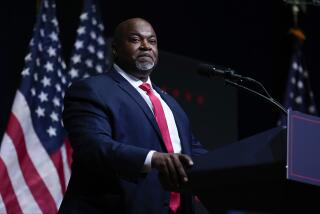Bush Has Reagan’s Coattails, but Race Is Dukakis’ to Lose
Despite rule changes intended to restore influence to party elders and interest to party conventions, the trend in American politics continues toward an ever earlier selection of presidential candidates.
In 1968, on the night of the California primary, Sen. Robert F. Kennedy could believe as he stepped down from the podium in the Ambassador Hotel that he was just starting out in his search for delegates and the nomination in Chicago. Today Gov. Michael S. Dukakis has that nomination more securely locked up than even Walter F. Mondale did at this stage in 1984.
As for Vice President George Bush, the Republican nomination has been a sure thing for him since Super Tuesday--March 8, in case you forgot.
With the exception of the Rev. Jesse Jackson, all the other contenders dropped out relatively early and the conventions will once again go unbrokered. This outcome was frequently predicted by Gov. Mario M. Cuomo of New York, but one wonders if he really believed his own prediction. The conventions in Atlanta and New Orleans this summer will retain interest--primarily for the choice of vice presidential candidates.
What are the prospects for the fall? Several political polls indicate that Bush is in trouble, and for once I think that they’re right. (Pollsters have not had a good election year, to date, starting out on the wrong foot with George Gallup’s forecast of a big victory for Bob Dole in New Hampshire.) The vice president is said to suffer from a “gender gap” problem: Women are less enthusiastic about him than men are. This may simply be because women are more perceptive about Bush’s seemingly irresolute character. (Women spend more time watching television, so there’s a good chance that more of them have seen the vice president live on camera.) If Bush is nudged by pollsters into the gender trap (the illusion that women want a woman rather than a strong President), and selects a Nancy Kassebaum-style moderate as his running mate, he could well sink even lower in the female estimation.
Do not underestimate Bush’s capacity to make an error of this magnitude, however. When not connected to the coattails of Ronald Reagan, he has shown little aptitude for electoral politics. His primary successes to date have clearly been due not so much to his stature as to his status as Reagan’s designated successor. In earlier senatorial and presidential campaigns, managed for him by his good friend James Baker, now the Treasury secretary, Bush kept losing. Today Baker is once again preparing to play a major role in Bush’s campaign. Baker’s misapprehension, shared by Bush, is to believe that Republican disagreements with Democrats should be as inconspicuous as possible--hardly a formula for winning from behind.
We are told that Bush went into politics at the urging of his family, for whom the political arena was synonymous with “public service.” And we are led to suppose that in this there is nobility. His wife, Barbara Bush, repeated the public-service mantra over the weekend as though it recommended her husband as a man of unselfish devotion. And I have no doubt that he is. But it leaves unanswered the question, important in this age of ideological division: What service, exactly, does he want to perform for the public?
Bush on stage reminds one of Mondale: mugging nervously for the cameras, as though seeking the good opinion of elders and betters watching from the wings. I am not saying that Bush cannot recover, but his only hope now is to focus attention on the critical issues dividing him and Dukakis: capital punishment, abortion, the size and role of government.
Unfortunately for Bush, however, his most potent issue, national security, has been taken away by Ronald Reagan himself. How can Bush depict Dukakis as soft on defense (which I believe he is) when Reagan himself is promoting a reckless scheme to reduce by half the number of our strategic missiles, possibly dismantling half of our nuclear submarines? Not even Jesse Jackson has gone this far. Indeed, Reagan’s antics in Red Square make Jimmy Carter’s 1979 peck on the cheek for Leonid I. Brezhnev seem hawkish by comparison. Bush’s attempts to dissociate himself from Reagan the Dove will probably not persuade the electorate. An ominous straw in the wind for Bush was Dukakis’ recent claim to be more conservative than “this crowd in the White House.”
Dukakis to date has run a brilliant campaign, avoiding commitments to interest groups and yet retaining their support. The man is fluent, articulate, intelligent--and probably as liberal as George McGovern. He has also been lucky. Jackson on his left has made Dukakis the centrist. Homosexuals have helpfully denounced him, knowing that he nonetheless supports gay rights. All this will change as people begin to focus on the issues--provided Bush puts the spotlight on the issues. But, at the moment, the election is Dukakis’ to lose.
More to Read
Get the L.A. Times Politics newsletter
Deeply reported insights into legislation, politics and policy from Sacramento, Washington and beyond. In your inbox three times per week.
You may occasionally receive promotional content from the Los Angeles Times.










